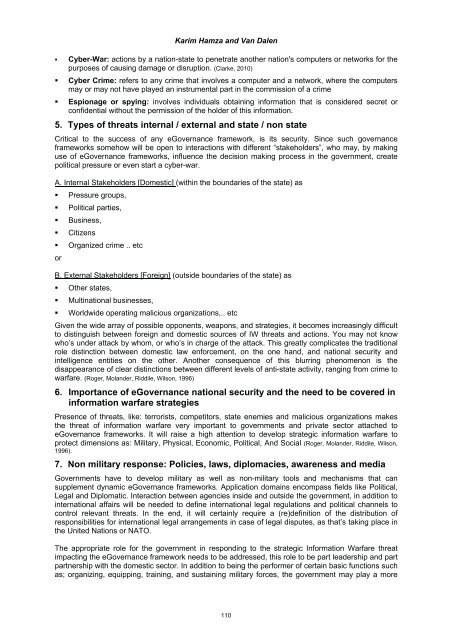6th European Conference - Academic Conferences
6th European Conference - Academic Conferences
6th European Conference - Academic Conferences
Create successful ePaper yourself
Turn your PDF publications into a flip-book with our unique Google optimized e-Paper software.
Karim Hamza and Van Dalen<br />
Cyber-War: actions by a nation-state to penetrate another nation's computers or networks for the<br />
purposes of causing damage or disruption. (Clarke, 2010)<br />
Cyber Crime: refers to any crime that involves a computer and a network, where the computers<br />
may or may not have played an instrumental part in the commission of a crime<br />
Espionage or spying: involves individuals obtaining information that is considered secret or<br />
confidential without the permission of the holder of this information.<br />
5. Types of threats internal / external and state / non state<br />
Critical to the success of any eGovernance framework, is its security. Since such governance<br />
frameworks somehow will be open to interactions with different “stakeholders”, who may, by making<br />
use of eGovernance frameworks, influence the decision making process in the government, create<br />
political pressure or even start a cyber-war.<br />
A. Internal Stakeholders [Domestic] (within the boundaries of the state) as<br />
Pressure groups,<br />
Political parties,<br />
Business,<br />
Citizens<br />
Organized crime .. etc<br />
or<br />
B. External Stakeholders [Foreign] (outside boundaries of the state) as<br />
Other states,<br />
Multinational businesses,<br />
Worldwide operating malicious organizations,.. etc<br />
Given the wide array of possible opponents, weapons, and strategies, it becomes increasingly difficult<br />
to distinguish between foreign and domestic sources of IW threats and actions. You may not know<br />
who’s under attack by whom, or who’s in charge of the attack. This greatly complicates the traditional<br />
role distinction between domestic law enforcement, on the one hand, and national security and<br />
intelligence entities on the other. Another consequence of this blurring phenomenon is the<br />
disappearance of clear distinctions between different levels of anti-state activity, ranging from crime to<br />
warfare. (Roger, Molander, Riddile, Wilson, 1996)<br />
6. Importance of eGovernance national security and the need to be covered in<br />
information warfare strategies<br />
Presence of threats, like: terrorists, competitors, state enemies and malicious organizations makes<br />
the threat of information warfare very important to governments and private sector attached to<br />
eGovernance frameworks. It will raise a high attention to develop strategic information warfare to<br />
protect dimensions as: Military, Physical, Economic, Political, And Social (Roger, Molander, Riddile, Wilson,<br />
1996).<br />
7. Non military response: Policies, laws, diplomacies, awareness and media<br />
Governments have to develop military as well as non-military tools and mechanisms that can<br />
supplement dynamic eGovernance frameworks. Application domains encompass fields like Political,<br />
Legal and Diplomatic. Interaction between agencies inside and outside the government, in addition to<br />
international affairs will be needed to define international legal regulations and political channels to<br />
control relevant threats. In the end, it will certainly require a (re)definition of the distribution of<br />
responsibilities for international legal arrangements in case of legal disputes, as that’s taking place in<br />
the United Nations or NATO.<br />
The appropriate role for the government in responding to the strategic Information Warfare threat<br />
impacting the eGovernance framework needs to be addressed, this role to be part leadership and part<br />
partnership with the domestic sector. In addition to being the performer of certain basic functions such<br />
as; organizing, equipping, training, and sustaining military forces, the government may play a more<br />
110

















